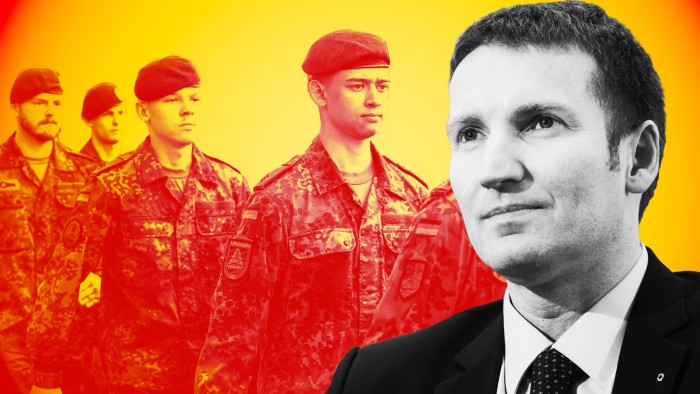Unlock the Editor’s Digest for free
Roula Khalaf, Editor of the FT, selects her favourite stories in this weekly newsletter.
Strict data protection laws are hindering Germany’s efforts to swell the ranks of the armed forces of Europe’s largest nation, its reservists’ association has warned.
Patrick Sensburg, head of the Reservist Association of the German Armed Forces, said tough German and EU privacy rules meant it could not keep in contact with close to a million people who might help boost the country’s reserve forces as it sought a stronger role in European defence and security.
Sensburg said that when Germany suspended conscription in 2011, it also stopped keeping track of former conscripts.
“We have lost their contacts,” he said in an interview with the Financial Times. “It’s crazy.”
The problem was compounded, Sensburg said, by European data protection laws and by additional rules in Germany, where memories of both the Nazi era and communist Democratic Republic have contributed to a culture of caution concerning the collection and use of personal data.
Germany’s new chancellor, Friedrich Merz, has promised that his nation will play a leading role in Nato and in defending Europe from Russian aggression, as the US under President Donald Trump has become more ambivalent about the alliance.
Merz has ended worries about financing the overhaul of the Bundeswehr by allowing unlimited borrowing for defence spending and officials say the armed forces’ biggest challenge is now personnel.
Carsten Breuer, the head of the armed forces, has said that the number of professional soldiers needs to grow from about 180,000 today to 200,000 by the end of the decade.
Breuer has also said the military needs about 260,000 reservists who can be called upon in a crisis to either defend their homeland or provide backup elsewhere when frontline troops are killed or wounded. That marks a dramatic increase from the figure of about 60,000 today.
European armies usually rely on three main recruitment channels to fill reserve forces: volunteers, former conscripts and ex-professional soldiers.
While Germany can draw on former full-time military personnel, it has no current conscription requirement — and limited places for civilians with no previous military experience.
The new government has said it will introduce a new, voluntary form of military service, but will only initially train about 5,000 young men each year.
Defence minister Boris Pistorius said in an interview with the Frankfurter Allgemeine Zeitung over the weekend that reaching the necessary number of reservists would also require “reactivating” some former soldiers.
The reservists’ association represents former national service conscripts and ex-professional soldiers as well as civilians who serve in the reserves. Sensburg said it received €24mn in government funding each year to provide support and training for former soldiers — and could potentially be a rich reserve of possible talent.
As well as having 115,000 paid-up members, the association also has responsibility for all 10mn people in Germany who previously did national service or were once professional soldiers.

About 9mn of these people are over 65, a reflection of the dramatic shrinking of Germany’s armed forces since the end of the cold war.
Sensburg said the association was not in contact with the remaining 1mn, which included about 93,000 people who had served in Afghanistan — a group he described as “high potential” reservists.
“We don’t even know how physically fit they are, if they would like to serve again.”
Sensburg, a former member of parliament from Merz’s ruling Christian Democrats, added that while some might be unwell or uninterested, if even only a quarter of the 1mn agreed to serve it would be enough to meet the target for reservist numbers.
He said it was absurd that the body responsible for collecting Germany’s annual television fee could contact citizens a few weeks after they had moved house, while he had no way of tracking down people whose names were in the association’s records.
The defence ministry said good communication with former soldiers was important for Germany, but so too was personal data protection.
“The ministry is continuously reviewing how the current data protection regulations can be reconciled with the requirements of reservist work — and also with the resumption of military registration and monitoring, which we are striving for as part of a new military service model,” it said.
It added that since 2021 soldiers leaving active service had automatically been registered as reservists.
Read the full article here




